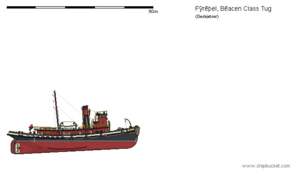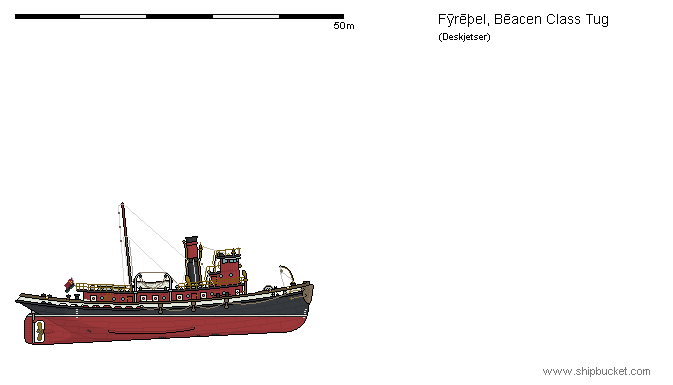Bēacen Class Ocean Steam Screw Tug: Difference between revisions
Deskjetser (talk | contribs) (→Notes) |
Deskjetser (talk | contribs) No edit summary |
||
| Line 10: | Line 10: | ||
}} | }} | ||
{{Infobox ship class overview | {{Infobox ship class overview | ||
|Builders=Brecanburg Shipwright Company | |Builders=[[Brecanburg_Shipwright_Company|Brecanburg Shipwright Company]] | ||
|Operators=Military and civilian | |Operators=Military and civilian | ||
|Class before= | |Class before= | ||
| Line 55: | Line 55: | ||
|} | |} | ||
Boasting the success of the [[Brēcæn_Class_Steam_Screw_Tug|Brēcæn Class]], the Brēcænburg Scipwyrhta Intinga<ref>(Lit: Brecanburg Shipwright Company)</ref> (Hereafter: BSI) set out to fill a role for a heavy duty ocean capable tugboat in 1885. What resulted would be a vessel equipped with one of the earliest commercial triple expansion engines, producing an incredible amount of power for the time; This allowed the tug to complete all but the most extreme workloads, and was found to be an invaluable tool in the naval yards of [[Federated_Fire_Territories|Fȳrland.]] | Boasting the success of the [[Brēcæn_Class_Steam_Screw_Tug|Brēcæn Class]], the [[Brecanburg_Shipwright_Company|Brēcænburg Scipwyrhta Intinga]]<ref>(Lit: Brecanburg Shipwright Company)</ref> (Hereafter: BSI) set out to fill a role for a heavy duty ocean capable tugboat in 1885. What resulted would be a vessel equipped with one of the earliest commercial triple expansion engines, producing an incredible amount of power for the time; This allowed the tug to complete all but the most extreme workloads, and was found to be an invaluable tool in the naval yards of [[Federated_Fire_Territories|Fȳrland.]] | ||
The first of its class, Bēacen, was bought before its keel was even laid, by the Fȳrflota, or Fire Navy; As part of an order of 6, for use towing hulls to be fitted out across different yards. In total 18 would be constructed between 1887 and 1898, and many would continue to see service well past the mid 20th century. | The first of its class, Bēacen, was bought before its keel was even laid, by the Fȳrflota, or Fire Navy; As part of an order of 6, for use towing hulls to be fitted out across different yards. In total 18 would be constructed between 1887 and 1898, and many would continue to see service well past the mid 20th century. | ||
Revision as of 15:59, 19 October 2019
 2px = 1ft
| |
| Class overview | |
|---|---|
| Builders: | Brecanburg Shipwright Company |
| Operators: | Military and civilian |
| Built: | 1887-1898 |
| In service: | 1887-1963 |
| Completed: | 18 |
| Retired: | 18 |
| Scrapped: | 17 |
| Preserved: | 1 |
| General characteristics | |
| Type: | Ocean Steam Screw Tug |
| Tonnage: | 410 t |
| Length: | 147.5 ft |
| Beam: | 26 ft |
| Height: | 56.5 ft (WL-Mast) |
| Draft: | 14.5 ft |
| Installed power: | 1000 ihp |
| Propulsion: | 3-Cylinder Triple-Expansion Reciprocating Steam Engine |
| Speed: | 10 knots |
| Capacity: | 9 t bollard pull |
| Crew: | 12-15 |
Boasting the success of the Brēcæn Class, the Brēcænburg Scipwyrhta Intinga[1] (Hereafter: BSI) set out to fill a role for a heavy duty ocean capable tugboat in 1885. What resulted would be a vessel equipped with one of the earliest commercial triple expansion engines, producing an incredible amount of power for the time; This allowed the tug to complete all but the most extreme workloads, and was found to be an invaluable tool in the naval yards of Fȳrland.
The first of its class, Bēacen, was bought before its keel was even laid, by the Fȳrflota, or Fire Navy; As part of an order of 6, for use towing hulls to be fitted out across different yards. In total 18 would be constructed between 1887 and 1898, and many would continue to see service well past the mid 20th century.
Producing 1000ihp for a speed of 10 knots, the class of ocean tug proved to be very utilitarian to the many operators throughout its life.
Notes
- ↑ (Lit: Brecanburg Shipwright Company)
